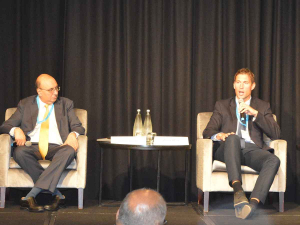FTA and Uber Drivers
OPINION: Expect the Indian free trade deal to feature strongly in the election campaign.
 Speaking at the India NZ Business Council ‘Boardroom to Border’ event in Auckland this morning, Indian public policy and business expert Ashok Malik says India provides enormous opportunities for NZ.
Speaking at the India NZ Business Council ‘Boardroom to Border’ event in Auckland this morning, Indian public policy and business expert Ashok Malik says India provides enormous opportunities for NZ.
New Zealand’s dairy sector cannot expect India to be a market for all its dairy products.
Speaking at the India NZ Business Council ‘Boardroom to Border’ event in Auckland this morning, Indian public policy and business expert Ashok Malik says India provides enormous opportunities for NZ, but he cautioned that the dairy sector’s expectations shouldn’t be too high.
“Can it be a market for all NZ dairy products- no,” says Malik.
“There may be opportunities for certain types of cheese but not mass-market cheese,” he told over 200 attendees.
Malik says with a population of 1.4 billion India shouldn’t be seen just as a market for products but for partnerships.
He points out that India, the world’s largest producer of milk, have cows used to producing milk in a hot climate but the yields are low. In NZ, cows produce more milk in “more comfortable conditions”.
“So, one country with scale and one with productivity and technology can work together and find common markets all over the world.”
A trade deal with NZ is one seven the Indian Government is working on. This week, India announced a free trade deal with the UK.
With NZ, dairy exports into India remains a tricky issue. A possible solution could be exporting specialised ingredients and products to Indian manufacturers and food service sector, rather than exporting NZ dairy products like milk and cheese.
Speaking at the event, Fonterra director for global external affairs Simon Tucker noted that the Indian dairy market was valued at US$200b and forecast to grow to US$600b by 2022 – a compound growth of around 13% per year.
On the supply side, India is expected to become the second largest dairy deficit market after China by 2025.
“Statistics are one thing and reality is another; let’s see how things play out in India,” says Tucker.
He says the Indian market will provide “niche opportunities” for Fonterra.
“We are never going to fulfil India’s dairy, but we can look at how to deepen our existing partnerships and look into things like supplying specialised proteins into nutritional and medical applications.”
Budou are being picked now in Bridge Pā, the most intense and exciting time of the year for the Greencollar team – and the harvest of the finest eating grapes is weeks earlier than expected.
The Real Estate Institute of New Zealand (REINZ) has released its latest rural property report, providing a detailed view of New Zealand’s rural real estate market for the 12 months ending December 2025.
Rural retailer Farmlands has released it's latest round of half-year results, labeling it as evidence that its five-year strategy is delivering on financial performance and better value for members.
OPINION: "We are back to where we were a year ago," according to a leading banking analyst in the UK, referring to US president Donald Trump's latest imposition of a global 10% tariff on all exports into the US.
DairyNZ says the Government’s proposed Resource Management Act reform needs further work to ensure it delivers on its intent.
Overseas Trade Minister Todd McClay says he's working constructively with the Labour Party in the hope they will endorse the free trade agreement (FTA) with India when the agreement comes before Parliament for ratification.
OPINION: Expect the Indian free trade deal to feature strongly in the election campaign.
OPINION: One of the world's largest ice cream makers, Nestlé, is going cold on the viability of making the dessert.